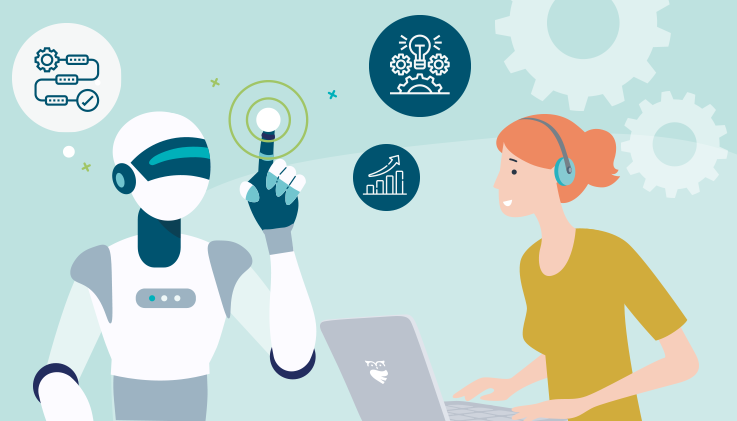Helpdesk automation systems have a fantastic ability to accelerate the ticketing process. Not only does helpdesk automation provide quick clarifications to customer queries, but also facilitates handling complex issues that can otherwise be difficult to complete manually.
Automated helpdesk helps brands aspire towards smart work rather than hard work.
To begin with, automation is the use of technology to perform tasks or processes without human intervention. Automation can be achieved through various means, such as programming, artificial intelligence, or robotics. Automation helps companies, no matter how big they are, to meet customer expectations and provide them satisfaction across all possible touchpoints.
When companies talk about automation, they generally refer to RPA and task-oriented automation systems within their business processes that help them achieve efficient operational excellence.
Hyperautomation, on the other hand, is an expansion of automation. It adds a layer of advanced technology which makes it possible to do more. What is this layer of advanced technology? It’s Artificial Intelligence (AI). Hyperautomation utilizes AI-based automation processes and can be created in setups consisting of multiple technologies, systems, and platforms together. The result of using hyperautomation in your business is intelligent responses to client queries and more efficient workflows providing operational excellence.
Hyperautomation can provide better productivity, and reduce expenses, thus increasing sustainability and improving team efficiency to provide better results and more return on investment.
Benefits of using hyperautomation in businesses:
Enhances automation: Utilizing hyperautomation minimizes any repetitive activity or tasks that require manual input and knowledge.
Improves team communication and collaboration: Hyperautomation is an amalgamation of intelligent features, software bots, RPA, and other tools that let users interact and exchange crucial product or customer information across all other business processes within the organization.
Provides agility to businesses: Hyperautomation integrates intelligent tools and makes it easier for companies to explore new opportunities to serve clients with meaningful and innovative solutions to their problems.
Offers advanced insights: Organizations using hyperautomation can help a business reach its potential by providing data and analytics from across all business processes.
Enhances productivity: Hyperautomation helps organizations drive productivity and client satisfaction by reducing manual, labor-intensive tasks, optimizing processes, and increasing team morale.
An interesting fact is that automation, more specifically robotic process automation (RPA), has been used for years by various industries for product/service delivery and customer service. Hyperautomation, on the other hand, is an emerging trend in customer experience (CX) strategies.
Identifying opportunities for RPA is common, and that has been done for centuries, but where brands miss out is utilizing hyperautomation to improve CX. Hyperautomation is extremely important for brands to make an impact on consumers as it simulates human reasoning ability by incorporating natural language processing (NLP).
When companies rely on hyperautomation, they rely on technologies that allow systems to make predictive decisions based on data. With hyperautomation, companies ensure their business processes make decisions based on each decision taken earlier and become smarter with the data that is continually collected. The success of the process depends largely on the amount and quality of data gathered and fed into the technology.
Also Read: Power of Artificial Intelligence — Transforming Customer Service at Scale
Hyperautomation is a critical component of customer success. It helps companies automate more than one process at a time, resulting in more work done in a shorter time. Let’s see how.
Example: Take the example of an e-commerce retailer. Most often, the biggest problem plaguing them is cart abandonment. Identifying the problem is the first step towards using hyperautomation to solve your problems. What could be the outcome the company is looking for? Lower cart abandonment rates for sure.
Utilizing hyperautomation, a combination of AI and ML, can help the organization predict which products and options a customer is likely to choose based on their history, the decisions consumers have made, and the customer’s current behavior on the website.
This is just one tiny example of how technology can help companies make decisions during the business process and create personalized experiences for the customer. Hyperautomation can help brands create an immersive experience for their valuable clients by way of recommending products, using photos or AR and VR-powered trial kiosks that are likely to appeal to them, and offering customized shipping options.
Also read: Roadmap to Usher Excellent Results in Customer Service in 2023 and Beyond
Stay future-ready with hyperautomation
Hyperautomation prevents business processes from going into silos and easily enables future integrations with newer technologies and service providers to create a wholesome experience for both team members and customers. Hyperautomation enables organizations to use intelligent reasoning and make changes to existing processes or modify workflows with the passage of time.
It is also easier for companies to create sandboxes and test which automation or combination of automation features to use in their hyperautomated processes. Identify which part of the process needs automation and then integrate it. One thing is certain — if businesses are slow in implementing automation, they may fall behind their competitors who are comparably more efficient.
OwlDesk by ThinkOwl is an AI-powered helpdesk that utilizes intelligent automation capabilities to help your customers and serve them better. Leverage the power of AI and automation to benefit your business and establish your brand within the galaxy of stellar CX providers. Book your 30-day free trial today.
